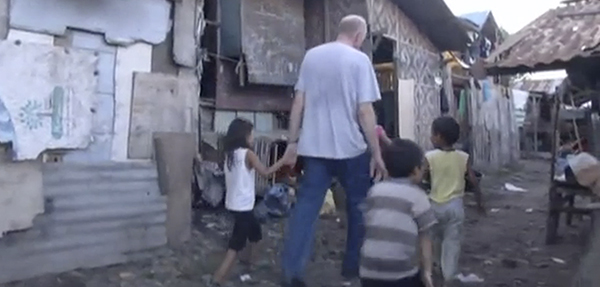Heinz Kulüke: Currently the Superior General of the Divine Word Missionaries; before he was a Professor of Philosophy and a garbage hunter, together with the marginalized children of Cebu, in the southern part of the Philippines.
Before the place used to be a real sea, of full light blue color, white infinite sand, amidst soft waves of salt and blazing sun. Now, this once idyllic place is a sea of garbage that grows without ceasing. The trucks, with their merchandise and continuous roaring movements, arrive night and day full of all sorts of rubbish that they dump all over the place. “The smell is horrible and unbearable. It sticks with you, and there is no way of getting rid of it. In the beginning, I had to remove all my clothes and hung them outside because their stench was horrible. It took me a while to get used to such a pestilent smell.”
All that said and done, the bad smell is not the worst of all, neither was it the gravest. Moreover, the heap of garbage in the city is a hotbed of illnesses, a breeding ground of infections, burns, intoxications and accidents. To get a clear idea of the dangers that entails living in the garbage, look at what Fr. Kulüke has to say: “there is a time I had to bury 17 children in one week alone.” He also says that sometimes, the children in the garbage dump accidentally encounter hands, legs and other human residues coming from the hospitals.
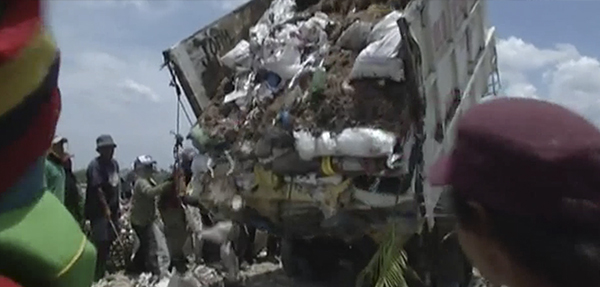
It happens that for the poorest of the poor of the island, the garbage that accumulates in this so-called “Smoking Mountain” is only their only means of survival. Therefore, within the periphery of such a dull and toxic mountain of dirt, a slum settlement emerged, a true city whose dwelling places are made up of tires, tins, plastics, and cartons. The biggest of the garbage dumps in Cebu City attracts a means of living for a thousand or more people w, the majority of whom are children. There are 625 families, amounting to 3000 people living on the garbage heap.
Pregnant women give birth in and around the garbage dump. The children are sent to the garbage heaps to dig dirt and turn around the muck with bear hands. They fill their sacks with plastic, glasses, metal and all sorts of rubbish. The children are the ones who suffer the most and the cheapest to hire for the recyclers. In return, the children of less than 7 years of age or maybe 9 or 10 receive two or three pesos for every full hamper. And, thanks to their work, the families can buy rice for their food. Otherwise, there will be nothing to fill their stomach that day. Thanks to their work in the dump, the kids guarantee the survival of the majority of the families.
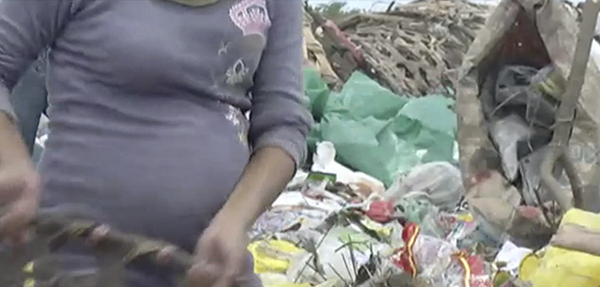
Now let us talk about the garbage dumps of Mandaue City. Mandaue City forms part of the suburban belt that circulates the city of Cebu. Cebu, as it is known, is one of the 7000 islands that form the archipelago and the nation of the Philippines. The Spanish expedition that sent Fernando de Magallanes arrived in Cebu on 21st April 1521, 495 years ago. There, a poisoned arrow robbed the life of the illustrious sailor when in uneven battle, fought with the followers of Lapu Lapu, then, a rival to Rajah Colombu. Lapu Lapu is today considered a national hero. The cross of Magallanes was also erected which until today remains the sign and symbol of the city. It is also from that place that guipuzcuan Juan Sebastian Elcano and Gonzalo Gomez de Espinosa, a Spanish from the northern Merindades of Burgos, would command the ships called Victoria and Trinidad respectively. Only the former ship, commandeered by Guetaria and 17 other survivors, completed circumnavigating this part of the word for the first time. On his part, the latter ship, that of the Merindades, was about to collide with the currents of the Kuro Shivo (Red River, in Japan) and half a century later, the guipuzcuan Andres de Urdaneta would discover. La ruta del tornaviaje (Manila-Acapulo) was a travel route during more than two and half centuries by all the Spanish ships starting with the famous galleon de Manila. But then scurvy affliction, the storms, and strong winds did not permit Gomez de Espinosa to complete his adventure. Pushed by the Portuguese he ended in the Limonero prison in Lisbon where he was rescued by Emperor Carlos 1, but died later.
Today, Cebu City which is 12000 kilometers from Madrid with almost 3 million inhabitants, is an economic and commercial center of the Philippines, besides Manila. The city has four garbage dumpsites. It is precisely there that the good Fr. Heinz Kulüke landed. For the Westerners, this German name “Heinz” sounds like tomato sauce, and it is true because the most renowned brand of Ketchup bears the same name. It paints red plates, hamburgers, hotdogs and barbecues across the world. Heinz is the 5th largest multinational food chain in the world.
There is no other Heinz, before this and anything. In German Heinz becomes the hypocoristic of Enrique that, in Spanish, we say Quique and, in Italian Enzo. Here and now, Heinz is a proper name of a person unique and admirable at the same time. Since mid 2012, he is the Superior General of the Society of the Divine Word. In his hands, is the rudder of the ship with more than 6000 missionaries work, dispersed and rooted in 67 countries in the world, navigating together with the poor of the world.
This German of the Lower Saxon was born 59 years ago in Spelle, which is a small village near the Holland border. He is the second born of 4 sons of Augusto and Paula. His parents died together on 11 November 2008. Heinz started his career as an electrician and studied electronics. After completing his military service in aviation, he went to study electronic engineering at the University of Applied Sciences of Bielefeld. But his destiny, against what seemed very evident wouldn’t be a question of volts and watts.
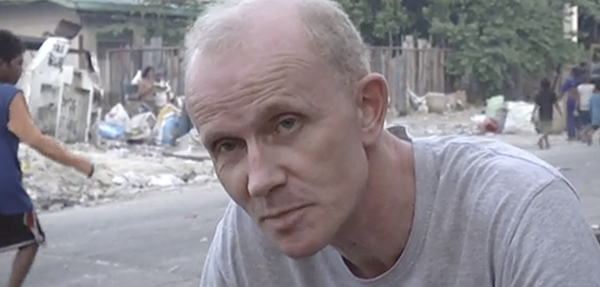
The young Heinz Kulüke used to combine his study of electronics and a very well paying job. But something deep in his conscience was pinching at every step. He did not see himself fulfilled and happy and one good day, something, nobody expected happened: Heinz left behind all electronics with its cables, diodes, ohms and circuits. He knocked at the doors of the Divine Word Missionaries, a congregation founded by his countryman Arnold Janssen, now venerated as a saint who was born in a nearby city of Goch, 150 kilometers south of Spelle that also borders Holland. Arnold Janssen was canonized in 2003 by Pope John Paul, II also a saint.
After setting up his steps towards the Divine Word Missionaries, the life of Heinz Kulüke underwent a very radical change. He disconnected himself from the electronics and set upon with renewed spirits his religious studies. In 1979, he did his novitiate near Bonn and in 1981 made his temporary vows. He was ordained a priest on March 9, 1986, and began his missionary journey in the island of Mindanao in the Philippines. He spent three years in the south of Agusan. He then traveled to the United States to study Philosophy at the Catholic University of Washington. He returned to the Philippines and taught Philosophy at the University of San Carlos run by the SVD in Cebu City. In 1994, he was accorded a doctorate in Philosophy by the Gregorian University in Rome. He returned once more to Cebu to give Philosophy classes at the University of San Carlos, where besides being a professor, he was appointed the Provincial Superior for the Southern Philippines.
But with a lot of intellectual work and not so few responsibilities that the office of the provincial entails, the good Fr. Kulüke didn’t still feel fulfilled and happy. He doesn’t know what it is, but even today like yesterday, he notices these pinches in the heart. Such a state drives him to believe that there is still something missing to complete his evangelical mission.
Father Heinz had heard people speak of the street children and about the hunters of garbage. And so, one beautiful day, he set out to clear the doubt on his account. After the philosophy classes in the University, he mounted his motorcycle and followed one garbage truck that took him to one of the most inhospitable corners of the world. Yes. It was very true. There they were before his very eyes, the sons and daughters of the garbage, the cheap ones. And after his discovery, he knew that the garbage site wasn’t a minor problem. The children who worked there daily were more than 600 or 700. It was difficult for the little ones to open the doors of their hearts to him. What is this European doing in our midst? “Be careful with him”, they were telling each other. And, suspiciously they were concluding that this European is there looking for anything good!
With a lot of patience, Fr.Heinz Kulüke visited the garbage site every day. With his backpack, full of pomades, bandages and tablets he treated those that were affected and wounded by the collection of the waste. Afterward, he made a significant step. Just like just the other children, he took a hook and started to collect recyclable materials. Immediately, the children realized that the European was not fairing any good in this work. The Philosophy professor was not good at his new activity. It is so much so that some kids feeling sorry for him, helped him to fill his basket. It was a valuable lesson in solidarity. He narrates: “When you are new in the dump, you don’t even know what to look for. The kids became my teachers. They taught me how to look for recyclable materials. To my surprise, they were feeling sad for me because while their bags were filling fast, mine was empty. Very often, some children used to share with me some recyclable from their baskets, in such a way that at the end of the day, I too had one or two dollars, as income. I all owe this to their generosity”.
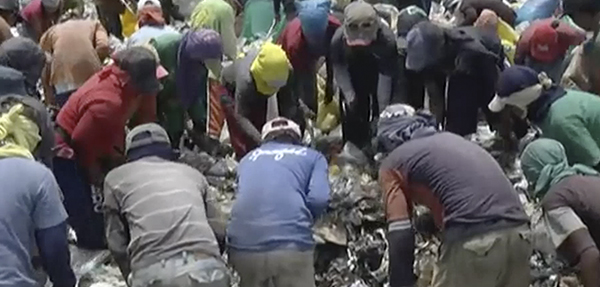
Once the shell of mistrust was broken, Father Heinz decided to stay and live in the dump site to share with the children their food, their diseases and their hobbies. And the kids once more showed him solidarity. They built for him a shanty with boxes and old tires where Father Heinz spent one full month. The children even got him a plastic cover so that the rains would not wet the shanty. He came out alive from the experience. Today, Father Heinz knows very well what it is like to live in the garbage. He got a mosquito net to protect himself from the insects, but the rats, carriers of worst rabies, made their way through holes they created.
His objective was presenting himself clearer and clearer every day. He had to get the children out of the garbage. But the question was how to do it? Their families had to choose between eating and not eating. And it was only fit not to cut this very vital source of income. But yes, by organizing nurseries and kindergartens for the little ones. That said and done, what began as a simple nursery for infants today is a network of 75 nurseries. This fundamental education would be the stepping stone that would help the kids to make it to the public schools and finally find a dignified job.
As though this wasn’t enough, Fr. Kulüke found time during the night to venture into the night clubs in the city suburbs where young women offer themselves to the tourists with a lot of dollars in their wallet and less scrupulous in the heart, who visit these places attracted by the neon lights. Fr. Kulüke, pushed by the power of the gospel once again decided to face the situation. He brought aboard the owner of the caverns and got his permission to distribute medicine to the women that needed them.
Fr. Heinz was in the middle of this new apostolate when the time arrived for the SVD (Societas Verbi Divini) to elect a new superior. And almost all the electorate gathered in Rome for the General Chapter focused their eyes on Fr. Kulüke to succeed Antonio Pernia from the Philippines. He indeed became the 11th successor of St. Arnold Janssen.
He began his work in the Generalate on September 29, 2012. And now, does this new responsibility obliged him to break his ties with the friends and children of the Smoking Mountain of Cebu? Fr. Kulüke explains that the office of the Superior General “has not impeded him to continue with his work in Cebu. He added, many Divine Word Missionaries work in Asia and I visit them very often. Three times per year, at the beginning and the end of the year, I remain for several weeks in Cebu, to propel projects particularly for the children that live in the garbage dumps. I too communicate with the colleagues working there through Skype. I maintain frequent contact with my collaborators in Cebu to continue this project for the poor”.
Thanks to the quiet but admirable work of Fr. Kulüke that today there are fewer children that spend their day in such toxic and pestilent dumps. Also, there are less and fewer shanties that surround the dump site because, by the help of some donors from developed countries, Father Heinz has been able to give dignified housing to many families in Cebu.
The economic help to construct the houses for the poor of the garbage, Fr. Heinz says, comes from Germany and Austria. In total eight housing projects have been completed so far. That is to say, 5000 families have received a new house. The new housing project has a capacity of 400 families, roughly for some 2500 people more or less.
For his dedication to the needy, Father Heinz Kulüke was awarded in Germany, his home country, with the military cross of merit. This is the only general character distinction that exists in Germany and, therefore, the maximum expression of recognition that the Federal Republic of Germany gives to those who stand out in their work for the common good.
Twenty-five years ago Father Heinz arrived in Cebu, and many considered him a fool. Three-quarters of friends and families said the same of Carlos de Forbin Janson, the French bishop of Nancy and the founder of the Missionary Childhood when he committed what he called “holy madness!” by dedicating all his wealth to the promotion, education, and defense of the neediest children in the world.
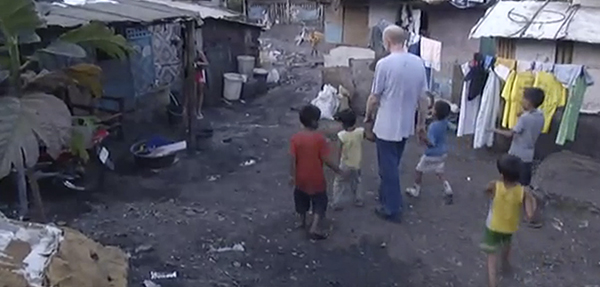
Fr. Kulüke says that “sometimes you got to be mad.” And he adds: “They said the same about Jesus. The biblical story about his people states that Jesus is a very well known mad character. And so it is proper that at times one has to be mad. Madness has a lot of significance in Philosophy, like mad Nietzsche. When one becomes angry, he adopts another point of view:. If I put myself in the shoes of the people who live in the dump, I am mad. The fact of being mad is an integral part of the person. It is something very important. And this is also some characteristic that the missionaries need to adopt into new situations
(Translated by Lawrence Muthee, SVD.)
Juan de VILLACOBOS
Journalist









